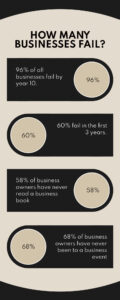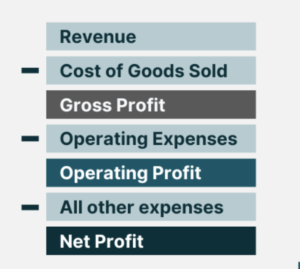7 business growth ideas guaranteed to bring you riches and happiness in 2024
This guy was sitting in front of me, talking about how he had grown his business with very little effort. He kept talking about these “7 business growth ideas.”
As he continued to talk, it was obvious he was a nut case.
He had the audacity to say his business was FUN!
Then he said he’d used these 7 business ideas that helped him with his incredible growth.
And then he said something that made me lean in.
Like when you’re watching a classic film and you know something strange is about to happen.
And he whispered something into my ear.
I’ll never forget what he said for as long as I live.
“If you stop playing the hero, I can help you too.”
At that moment, I knew I was going to triumph.
I didn’t know when. And I didn’t know how.
If I could show some grit and determination.
I could make a miracle happen.
Over the next 3 years, some spectacular things materialised:
– I grew my business by more than 307%.
– Then I won 4 global awards despite thousands of competitors.
– And my business took off.
It wasn’t painstaking either.
I’d say it was fun. And looking back, he was right. It did seem effortless.
All because of those 7 business growth ideas.
If you want to learn how to grow your business by more than 300%. Pay yourself more than you ever have in your life. All whilst running a business that you enjoy. Then you’d better read on.
Make sure you pay attention to the 7 business growth ideas. Especially number 3.
It’s impossible to grow without that one.
Why is business growth so important?
DCI ran a report that shows how many companies fail in their first 3 years.
The number is breathtaking.
If you’re a start-up business, you might want to look away now.
Michael Gerber also states some bold stats in his best-selling book “The E-Myth”.
In the book, Michael suggests that 96% of companies fail before year 10.
And the 4% that survive, aren’t always happy or profitable either.
It makes you wonder, doesn’t it?
Why do so many businesses, daring to be great, get it wrong on a sensational level?
We’ll take a look at why a little bit later on.
But one thing is for sure.
Profit is a condition for survival.
If you aren’t making a profit there’s only so long you can last.
When a company is running at a loss, it’s running on debt.
Whether it’s the owner of the business that keeps chucking money in to save the day.
Someone is giving the business money to survive.
Whilst profit is a clear condition for survival.
There’s something else that’s essential too.
You’ve heard the old saying “you either grow or die.”
That’s never been more true in business than it is today.
If you aren’t growing, you are standing still. And that’s the best-case scenario.
The chances are if you aren’t growing, you are shrinking.
And in either of those scenarios, it spells trouble.
Whilst a company stands still. Costs are going up. Your suppliers start to increase their prices.
Your competitors start to take some of your customers.
And a rise in inflation means everything else is getting more expensive too.
Sooner or later, that’s going to eat into your profits.
Until you are running at a loss.
That’s where the nightmare starts.
Because as we know, profit is a condition for survival.
Do the maths. Then you’ll realise, it’s impossible to stand still forever.
You have to grow to survive.
The 7 Ideas
That’s where the 7 business growth ideas come in.
These ideas will give you hope. And they’ll also help you start to unlock your potential.
It may seem strange at first. Prioritising these 7 strategies over fighting fires.
But the results will be incredible.
And for the hundreds of business owners, we’ve shared them with since.
100% of our customers said they would recommend the 7 business growth ideas.

100% of our customers said they would recommend the 7 business growth ideas.
Whilst 77% of them said they’d seen staggering results.

The change since using the business growth ideas
Almost a third had seen more than 100% growth in under 12 months.
These 7 business growth ideas have helped big companies and small ones too.
They’ve helped product-based businesses and service-based companies.
They’ve helped companies that make millions and companies that were breaking even.
And I’m certain that they can help you too.
The 7 ideas helped Mark Collier.
Taking action on the 7 business growth ideas
They changed his whole life.
When we first started working with Mark, he was running out of hope.
His team was difficult to manage.
The cash flow was all over the place.
And he didn’t know what to do next.
So I shared some of the basic ideas and principles with Mark.
Within a few months, things started to happen for Mark.
He was becoming more confident. He’d fixed his cash flow. And his team was starting to perform.
But most of all, they gave him his life back.
All Mark did was take action.
He worked on these ideas and put them into practice.
Nothing complex.
No magical pill.
He worked on the business and implemented the things he had learned.
Now it’s time for you to learn them as well.
Then make sure you take action on them. Some people need accountability to help them follow through. Whilst others take no action at all. They read them and forget they ever existed.
Almost no one does them alone.
With no guidance or support.
And that’s one of the reasons that 96% of companies fail.
My hope is that you’re different.
Here they are, the 7 business growth ideas guaranteed to bring you riches and happiness in 2024.
1. Get your marketing right
Marketing is the heart and soul of your business.
I’m sure you’ve heard the phrase “marketing is where it starts and ends.” Well, it’s true.
Marketing is the most important function in business.
It’s what gets your product or service in front of potential customers.
If you have the best product in the world, but no one knows about it, you’re in trouble.
But if your product is average, exceptional marketing can make it a great hit.
That level of marketing can propel your business to success.
Marketing isn’t about the products, it’s about connecting with your audience.
It’s about creating desire.
Attaching emotion to whatever it is that you are selling.
So, what are the rules for great marketing?
Here are five key principles to keep in mind:
1. Know your audience.
To create effective marketing campaigns, you need to know who you’re targeting.
What are their needs, wants, and pain points? What motivates them?
If you knew that you’re audience all had a burning desire to lose weight. And you found out that they all watched a certain podcast. You could advertise your weight loss products or services on that podcast.
You have to know what your audience wants and where they hang out.
2. Focus on benefits, not features.
Don’t list the features of your product.
Listing features like “real leather” or “spare wheel included” doesn’t help create desire.
Instead, focus on the benefits it provides. How will it make your customers’ lives better or easier?
What problems does it solve?
Examples of benefits would be “improve productivity.” Or “make your job easier,” you might even use “save money,” or “get things done faster.”
What is the result that the product creates? That’s the real benefit.
3. Be authentic.
Consumers are savvy and can spot a fake a mile away. Be true to your brand and values, and avoid gimmicks or false promises.
Don’t try to appeal to everyone. Be true to yourself and you’ll attract customers like you. Authenticity builds trust.
4. Stay consistent.
Consistency is key when it comes to marketing. Your messaging, branding, and tone should be consistent across all channels and campaigns.
Being consistent with your marketing activity also helps. It means people are more likely to see your marketing. It helps to build recognition and reinforces your brand’s identity.
5. Measure and adapt.
It’s important to measure the success of your marketing campaigns and adapt as needed.
Use data to track your progress and identify what’s working and what’s not. This allows you to make informed decisions and improve your marketing.

Top 10 lessons for marketing during a recession
2. Make sure you can speak the language of business
Imagine two competitors racing across Paris to win a prize.
They have no technology or maps, and they have to ask locals for directions.
The only problem is, one competitor speaks fluent French, and the other doesn’t.
Who do you think is more likely to win?
You got it, the French speaker!
It’s the same in business, if you don’t speak the language you’re going to lose to your competitors.
What is the language of business?
People get left behind when they don’t understand finance.
Hundreds of our customers have lost income. It ends up sitting in their balance sheet.
Because they didn’t speak the language, they avoided looking at their balance sheet.
They used the ostrich tactic and buried their head in the sand. Hoping it would all go away.
That’s why it’s important to check it, understand it, and use it to make informed decisions.
Without a strong foundation, the whole structure can collapse.
The same is true in business. Without a solid grasp of finance, a business can crumble.
Don’t let your hard-earned money go to waste. Take control of your finances, and learn to speak the language of business.
Stop relying on these people…
One of the biggest mistakes we hear business owners make with this is “my accountant does all that for me.”
While accountants can be valuable it’s important to understand that you can’t rely on them. Here’s why.
First of all, accountants often have hundreds of customers. That means they can’t be proactive.
A good accountant can help you with tax returns and bookkeeping. But they may not have the time or resources to dig deep into your finances.
With so many customers they may also have limited knowledge of your industry or business. It limits their ability to provide tailored advice.
Accountants are often reactive rather than proactive when it comes to financial management. They respond to notifications from HMRC or emails from clients. It’s the only way they can operate.
They don’t have the chance to be proactive and analyse your financial statements. As a result, they may not be able to identify areas where you’re losing profits.
They won’t have time to see where you have cash and working capital tied up in the balance sheet either.
Of course, this isn’t to say that accountants are not valuable. They can help you with important financial tasks. Things like preparing tax returns and ensuring compliance with regulations.
It’s important to understand your business’s finances. That way you can make strategic decisions that will drive growth and profitability.
It’s on you to be proactive, not your accountant.
You have to take the time to analyse your financial statements yourself.
The responsibility for managing your business’s finances lies with you.
You can’t rely on your accountant to make financial decisions for your business.
A final tip on finance
Finally, here’s a top tip for getting to grips with your finance in business.
Don’t be afraid to ask questions, even if they seem silly or basic.
Financial experts often use jargon and complex terms. That doesn’t mean you can’t ask for clarification.
It’s worth learning the jargon. Once you do, it’s so much easier to understand business finance.
You can also read financial statements, attend webinars, and take courses to improve.
Seek advice from experts, and don’t be afraid to get your hands dirty by digging into the numbers.
Remember, the more you know, the more confident you’ll be in making financial decisions.

Business Growth Ideas
3. Be a business owner, not a hairdresser
Many small business owners, like hairdressers, spend years learning technical skills. For example, the average hairdresser can spend u to 3 years learning how to cut hair.
Then when it comes to running their own business, they often don’t have the same level of expertise.
If a hairdresser develops some skills as a technician. And they become spectacular at cutting hair, they could become more confident.
They might get a few clients and decide to go into business on their own.
Then they might set up a shop and have it fitted.
But they also have a brand new profession.
They become a business owner.
And how many years do most business owners spend learning their new profession?
Most small business owners have never studied business. And don’t understand the game they are playing.
Understanding the game you are playing…
It’s essential to recognise that building a successful business needs you to work on it, not in it.
You can’t grow a business by cutting more hair or providing more services.
If you want your business to thrive, you need to take a step back and work on the bigger picture.
This means focusing on business strategy, marketing, financial management, and operations.
These are the areas that will enable you to grow your business.
Working on the business means developing a plan for growth.
It also means investing in your own development. That means seeking out coaches, mentors, and experts who can help. By working on the business, you can take a strategic approach to growth.
It’s a much better approach than relying on day-to-day operations to keep things afloat.
In conclusion, building a successful business requires more than technical skills. It requires a focus on business strategy, financial management, marketing, and operations.
By working on the business, you can take a step back and see the bigger picture. Then you can identify opportunities for growth, and develop a plan to achieve your goals.
So, take some time to work on your business, not in it, and you’ll be on the path to success.
If you don’t, you might just join the 96% that fail.

How many businesses fail?
4. Who not how
When it comes to figuring out how to grow your business, it’s easy to get bogged down in the details.
We spend countless hours trying to figure out how to fix a problem or improve a process.
But what if “how do I fix this?” was the wrong question?
A better question might be “who can help me fix this?”
The truth is, finding the right people can be the key to unlocking growth and success in your business.
Small business owners often fall into the trap of trying to do everything themselves.
Then when they hire team members, they can try to get them to follow a similar path.
Their employees often take on too many different roles. They never become strong in any one area because, like the owner, they are wearing many hats.
But this approach can be a recipe for burnout, stress, and, failure.
Instead, it’s important to find the right people who can help you grow your business and take it to the next level.
And where you can give each team member one specific role or task to complete.
Finding the right people means identifying individuals who are passionate about your business.
You also want to find people that have the right skills and experience.
It’s always a benefit when they share your values and vision too.
These people can help you fill in the gaps in your own skillset. When you hire people better than you, they bring fresh ideas and perspectives to the table.
In conclusion, when it comes to growing your business, ask yourself who do I need to speak to?
Rather than how can I do this?
That single question can be a game-changer.
Take the time to find the right people, and watch your business soar to new heights.
5. Prioritise profit over growth
Looking to take your company to the next level? Tempted to focus on growth above all else.
After all, isn’t that what successful businesses do?
Let me tell you, it’s time to shift your focus to something else:
You see, many business owners fall into the trap of believing that growth is the only metric that matters.
They’ll do anything to increase their revenue, even if it means sacrificing profitability.
But here’s the thing, growth for growth’s sake isn’t sustainable.
Sure, you might see a short-term boost in revenue, but at what cost?
Your bottom line can suffer, and if it does, sooner or later, so will your company.
Here’s the truth. It’s much easier to grow when you’re profitable.
When you’re making money, you have more resources to invest.
You might invest in new projects, expand your team, and explore new markets.
You’re not scrambling to cover your expenses or take on debt to fund your growth.
Plus, when you’re profitable, you have a safety net to fall back on if things don’t go as planned.
Now, let’s talk about a little something called “growing broke.”
This is what happens when you focus on growth over profit. You might be bringing in more revenue, but you’re also spending more money to make it happen.
Your expenses are skyrocketing, but your profits aren’t keeping up.
Before you know it, you’re in the red, and you’re struggling to keep the lights on. It’s a vicious cycle, and it’s not one you want to find yourself in.
So, what’s the bottom line? Prioritising profit over growth might not be as glamorous or exciting.
But it’s the smart choice for any business owner.
Any business owner that wants to build a sustainable, successful company.
Focus on making money first, and healthy growth will follow.

Speak the language of business
6. Let your customers tell you what to do
Lots of business owners have ideas.
But being a fast-paced, busy entrepreneur has its drawbacks.
They can often run with ideas without doing any research or without getting any feedback.
Then the idea comes to market and flops. There was only the entrepreneur that thought it would work in the first place.
Market research should cover a few key areas.
The first is running an analysis of the market’s stage of awareness about you and your product.
That means understanding how familiar your customers are with the problem you’re solving.
It also means understanding how knowledgeable they are about the various solutions available.
You’ll also want to dive into the emotional forces that drive the market.
What motivates your customers to buy?
What fears or desires do they have around your product or service?
Finally, you’ll want to assess the potential for sales in your market.
Then you can get a sense of how much demand there is for what you’re offering.
But that’s not all. Market research with your customers can also help you refine your product or service.
It might help uncover new opportunities. Or even identify potential roadblocks before they become major issues.
By gathering feedback from your audience, you can learn what they love about your product. You’ll also learn what they don’t love, and what they wish you would offer instead.
You can also get a sense of what pricing points they’re comfortable with.
And even what channels they prefer to use for purchasing.
In short, asking your customers for feedback and conducting market research is critical. It’s an essential step in building a successful business.
By understanding your target audience, you can learn how to meet their needs.
7. Make the best product possible
Getting the product right can be so important.
When a product comes to market that fits like a glove, magic happens.
Look at Apple with the iPhone.
As soon as that hit the market, people went crazy for it.
After all, your product or service is the heart and soul of your business.
It’s what sets you apart from the competition and keeps your customers coming back for more.
That’s why it’s so important to make the best product possible and to put your heart and soul into every detail.
One key factor in creating a top-notch product is understanding how it fits within the market.
You’ll want to do your research and figure out what gaps already exist. You might also want to speak to customers to find out what features or benefits will be most appealing.
Match your product or service with the needs and desires of your customers. That’s where you’ll create something special.
Something that they can’t find anywhere else.
And that’s only the beginning.
Making the best product possible is also important for building a strong brand.
If you have a strong product or service generating positive word-of-mouth becomes easy. So does driving customer loyalty.
When your customers see quality and innovation, they’ll be more likely to trust your brand. It’ll mean they recommend it to their friends and family more often too.
And when you continue to improve your product, you’ll keep your customers engaged.
It will get them excited about what you are going to offer next.
In short, making the best product possible is essential.
Remember to understand your market. Build something special, and create a loyal customer base. Then you’ll set yourself up for long-term growth and success.
So keep pushing yourself to innovate and improve. That way you can keep your customers happy and create raving fans.
Conclusion
These 7 business growth ideas helped bring me riches and happiness. They gave me my life back as they did for Mark.
And I know they can help you too.
Within a few months of implementing them, I saw incredible results:
– I grew my business by more than 307%.
– Then I won 4 global awards despite thousands of competitors.
– My book became a best-seller on Amazon.
– And my business took off.
It’s impossible to grow a business without number 3 on the list.
Whether it’s making the best product you can, or completing your research.
You have to work ON the business.
My hope is that you become a business owner, rather than a hairdresser or technician.
And that you learn the language of business which we spoke about in the 2nd business growth idea.
But the top of the wish list is for you to get your marketing right. Because if you don’t, you might have the best product or service in the world.
But no one will know about it.
So if you’d like to have a chat about how you can take action on these 7 business growth ideas, reach out. Then we can answer any questions you might have.
Let us know in the comments, are there any of the 7 business growth ideas stand out for you?
And what ideas have you had that helped you grow?













